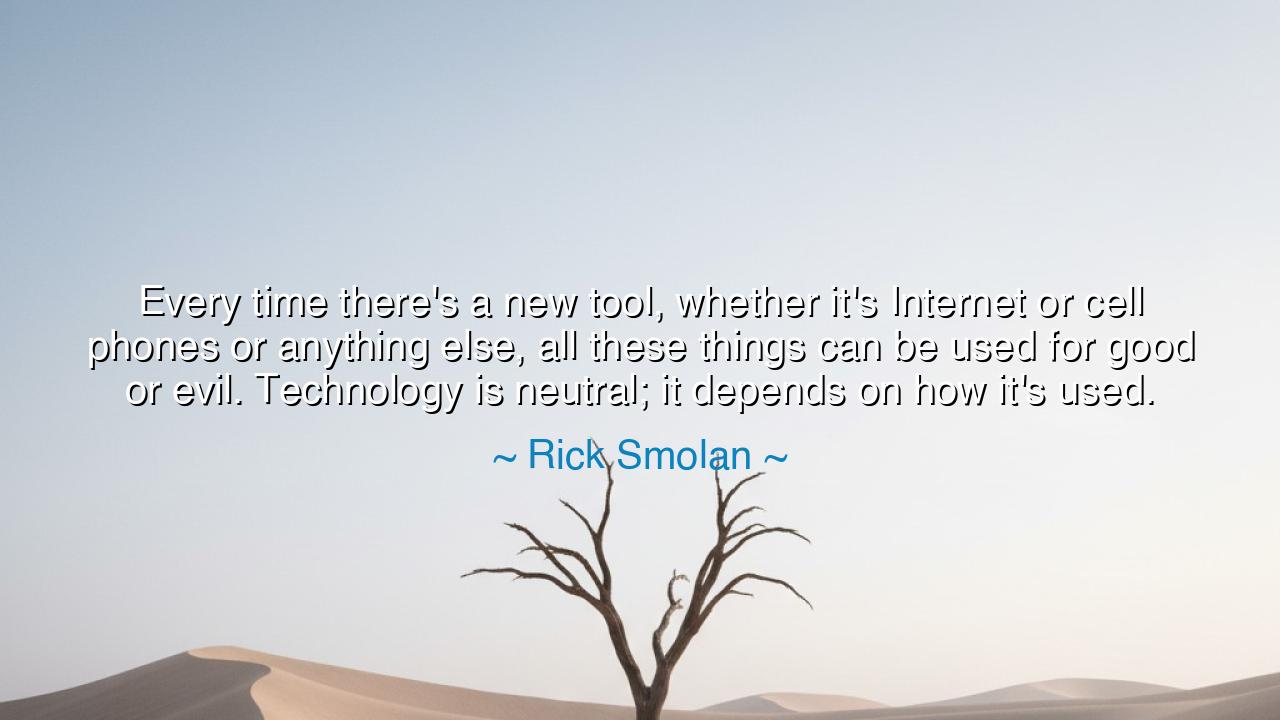
Every time there's a new tool, whether it's Internet or cell
Every time there's a new tool, whether it's Internet or cell phones or anything else, all these things can be used for good or evil. Technology is neutral; it depends on how it's used.






Hear the words of Rick Smolan, a chronicler of the human condition, who declared: “Every time there’s a new tool, whether it’s Internet or cell phones or anything else, all these things can be used for good or evil. Technology is neutral; it depends on how it’s used.” This wisdom speaks to the eternal truth that the worth of our creations lies not in the objects themselves, but in the hearts and intentions of those who wield them. A sword may defend the innocent or slaughter the helpless. A pen may proclaim freedom or spread lies. A network may connect families or entangle them in chains of deceit. The tool is neither angel nor demon—it is the soul of the wielder that decides its fate.
The origin of this teaching is as ancient as humanity itself. When fire was first tamed, it brought warmth, light, and nourishment. Yet the same fire, turned loose in hatred, brought ruin and ashes. In every age, the same principle has returned. The printing press spread the words of scripture and knowledge, but also inflamed wars with propaganda. The radio united voices across nations, but also carried the poison of tyrants into the homes of millions. Technology, Smolan reminds us, stands always at the crossroads, awaiting the direction chosen by humankind.
Consider the rise of the Internet, the greatest web ever spun by human hands. In it lies the possibility of connection across continents, the free exchange of knowledge, and the voices of the silenced raised into the light. Yet within it also lie falsehood, exploitation, and shadows where cruelty hides. It is not the Internet itself that is holy or corrupt, but the choices of those who shape and use it. Smolan’s words remind us to look not merely at the invention, but at the intent that drives it.
History gives us sharp examples. Think of the splitting of the atom. In one age, it powered cities with clean light; in another, it unleashed destruction upon Hiroshima and Nagasaki. Was the atom good or evil? Neither. It was neutral, awaiting the decision of mankind. The same discovery that could have saved the world from want also brought fear of annihilation. Here we see the eternal warning: technology depends on how it’s used, and that choice belongs to us.
This truth is not given to frighten, but to awaken responsibility. We must not bow down before machines as gods, nor curse them as demons. We must see them as tools, reflections of our own values. If we pour love, justice, and wisdom into them, they will magnify those virtues. If we pour hatred, greed, and ignorance into them, they will magnify those vices. The true power of technology is not in circuits or code, but in the moral compass of those who guide it.
Therefore, O seekers of wisdom, let your use of tools be guided by conscience. Ask always: does this invention heal or harm? Does it connect or divide? Does it uplift or destroy? Do not be deceived by the brilliance of invention alone, for it is a mirror reflecting what lies in the human heart. Train that heart first in virtue, and only then let it shape the tools of tomorrow.
Take this lesson as both command and comfort: technology is neutral, but you are not. Your choices give it direction, your will gives it character, your spirit gives it purpose. Use it, therefore, as a bridge to understanding, as a shield for the weak, as a torch to light the darkness. For every new invention is a crossroad, and the future depends not on the tool itself, but on the hands that wield it with courage and wisdom.
Thus, remember Smolan’s teaching: every tool may serve good or evil. The power is not in the tool but in the soul. Choose well, act justly, and the inventions of your age shall not curse you but bless generations to come.






AAdministratorAdministrator
Welcome, honored guests. Please leave a comment, we will respond soon